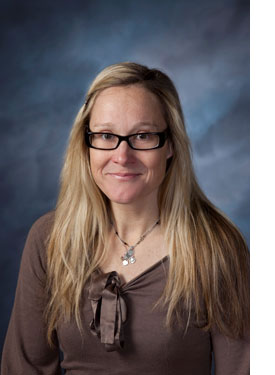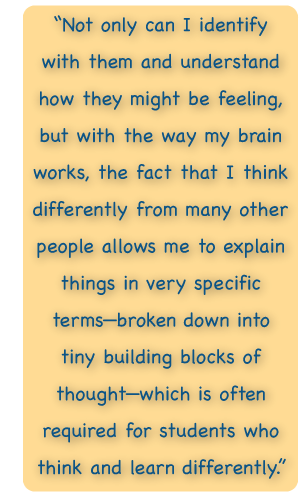Liz Ball, Teacher at the Beth Chana Academy
In 1996, Elizabeth “Liz” Ball spearheaded a class-action lawsuit against Boston University for disparaging comments made by the university president about students with disabilities, and for the school’s refusal to grant them waivers from the foreign language requirement. The landmark case Guckenberger v. Boston University helped to interpret federal and state antidiscrimination laws and mandated monetary awards to students who had been discriminated against. As a lawyer and consultant on disability law and education, Ball later helped various colleges, high schools, and elementary schools establish and implement their Academic Support Services. She set up the program at Miss Porter’s School to serve students with learning issues, was a member of a five-part team of learning specialists at The Foote School. She currently works as a therapeutic riding assistant at Turning Point Farm Animal Assisted Therapy Services, and teaches English and Algebra at Beth Chana Academy.
By Liz Attebery

Liz Ball is uniquely suited to work with dyslexic children. Having been severely dyslexic as a child, although not diagnosed until college, she knows what it’s like to struggle endlessly to recognize and pronounce letters. The fact that her non-dyslexic twin sister read effortlessly compounded Ball’s frustration as a child. But she never gave up, even when plagued with migraines and insomnia at age nine, and she eventually learned to read, graduating at the top of her high school class.
At Turning Point Farm, Ball assists with “riding instruction and equine facilitated learning for children with disabilities.” She uses her experiences growing up with dyslexia and working as a learning specialist to help students at Turning Point Farm and Beth Chana Academy, an all-girls school that “embraces tradition and technology simultaneously in small single-sex classes.” At The Foote School, Ball was one of five full-time learning specialists who worked in the classroom and in small groups with students who had dyslexia and other learning differences. “What’s great about Foote is that the school gets it,” says Ball. The faculty understood “that all children think and learn differently, and because of that basic understanding, and respect, the teachers and administrators support the differentiated instruction and modified assessments and accommodations.”
As a teacher and learning specialist, Ball says she draws on her experience as a dyslexic child, and on “all the emotional torment” she endured, to relate to her students. “Not only can I identify with them and understand how they might be feeling, but with the way my brain works, the fact that I think differently from many other people allows me to explain things in very specific terms—broken down into tiny building blocks of thought—which is often required for students who think and learn differently.”
Ball feels that teachers often don’t realize that students who struggle to learn enjoy it the most. “Despite the difficulties dyslexics experience along the way, we often thrive when challenged, becoming even more intrigued and curious when faced with seemingly unsolvable puzzles,” she says. “We are especially invigorated when our unique perspective is recognized and valued.”

The road Ball traveled to go from struggling student to learning specialist required the support and encouragement of her mother, who she says “worked hours and hours teaching me to read,” and a dedicated corps of teachers. The latter made such an impression on her that she can still remember the name of every teacher she had from nursery school through twelfth grade. That, she says, “is a testament to the incredible school I attended, where every student was treated with respect, and a love of learning was kindled.” Her school “a great little private school that encouraged creativity, curiosity, and the inquisitive mind of every child” took a multisensory approach to reading instruction, focusing primarily on phonics for struggling readers, and hands-on, project-based instruction incorporating art, music, acting, and outdoor recess every day of the year.
At Carleton College, Ball was accepted without benefit of extra time on the SAT because her disability had not yet been diagnosed. She struggled with Spanish and calculus but excelled in literature and philosophy, and despite being a self-described “terrible speller and a very slow reader,” she became an avid reader and writer. Originally intending to become an attorney, Ball received extended time on the LSAT, did very well on it, and graduated cum laude at Boston University Law School, where her “single most rewarding experience” was her involvement in the antidiscrimination lawsuit.
Her decision to become an educator was serendipitous, but never regretted. After graduating from law school, she and her then-husband moved to Charleston, South Carolina, where Ball took a job teaching at a school for dyslexic students. “I loved it and I never looked back,” she says. “It’s the best job I could ever imagine.”
Liz Ball is also the author of “From One Teacher to Another.”
Click here to read the article.
Related

David Schenck, Educator & Founder of the Schenck School
In 1959, David Schenck set out to help children overcome their dyslexia, and recover their lost self-esteem, with the core belief that “Schools should not frighten children.” Schenck, the man who founded the school for dyslexics in Atlanta, Georgia, and took the visionary approach of teaching a classroom of children with dyslexia using Orton-Gillingham (originally developed for one-on-one instruction), only learned about his own dyslexia during a fateful career change in the 1950’s.
Read More